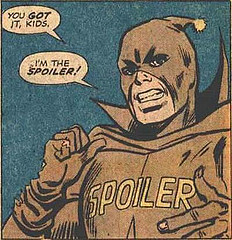
Source: Libri books2, Twice 25, Wikimedia
You’re hurrying to get to your next class, and your friend stops you and asks about the book you just finished. The book is new, and there’s been a lot of publicity about it, so your friend wants to know if it’s as good as everyone says. Because you’re in a hurry, you might only say “it’s good” or “it’s not that good.”
If it’s good, you might also glance at your watch and tell your friend what the book is about—a summary. You might even discuss your opinion in greater detail saying why you think it’s good or bad—a critique. Yeah, I know; you’re going to be tardy.
You summarize movies, books, and TV shows for parents and friends all the time, but when you give your friends and family a summary, you often give them a critique as well. It’s hard to summarize a movie you’ve seen or a book you’ve read and not offer a critique because, after all, a critique is an opinion, and hey, we like our opinions!

Source: spoiler, meqal, Flickr
In this lesson, you’ll learn how to write an effective summary using reading strategies to help ensure that the summary contains enough information without including unnecessary details. Have you ever had a friend who thought she was giving you a summary of a movie but instead gave you a scene-by-scene description? You know the ones who say, “and then this happened, and then this happened . . .” while your mind wanders and your eyes roll. This lesson will save you from creating that kind of summary. You will also learn what to include in a critique. Who knows, you might even become the go-to person at your school for book and movie reviews!
Learning how to summarize correctly means that you are reading well, you understand what’s important in a text, and you know what can be left out without losing any of the main points. That may not seem like a big deal, but when you’re reading difficult texts, sometimes it’s easy to get bogged down in the details and lose sight of the main ideas.
It’s also important to know that a critique is someone’s opinion. At times, you may ask for a summary from someone and get a critique. For example, you might want a summary rather than a critique of a new book so that you can form your own opinion. Sometimes we allow other people’s opinions to inform our own, but in order for this to be a conscious decision, you need to be an intelligent reader who can distinguish between a summary and a critique.